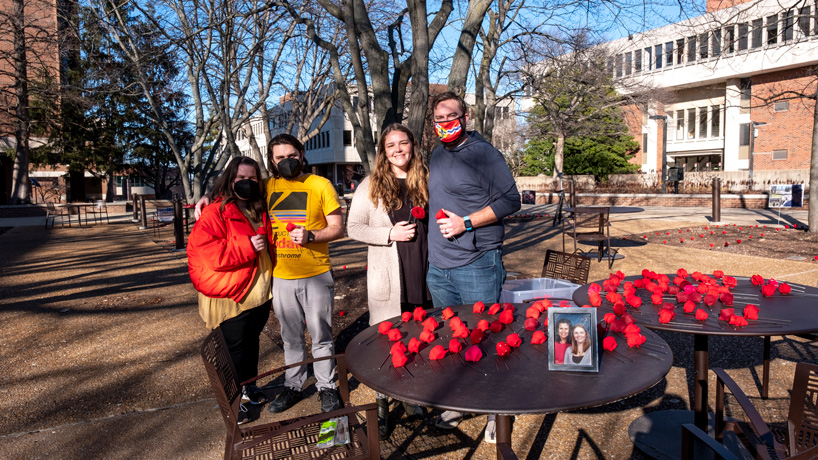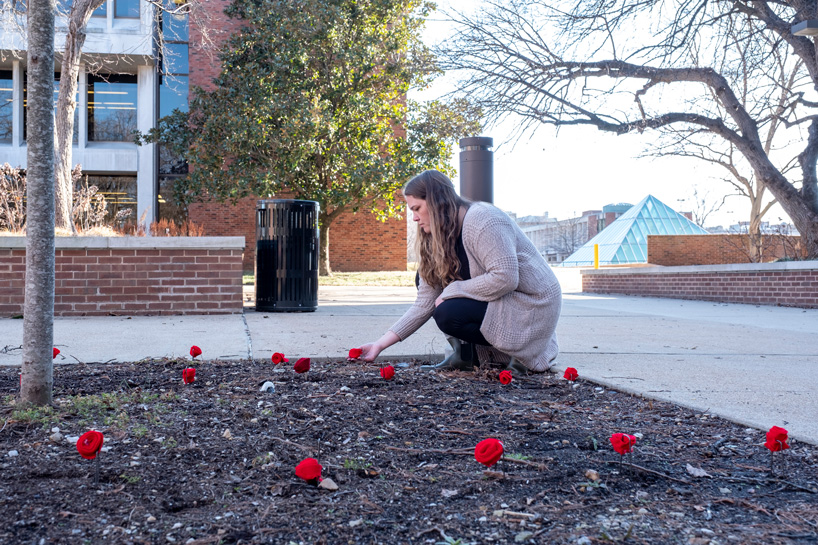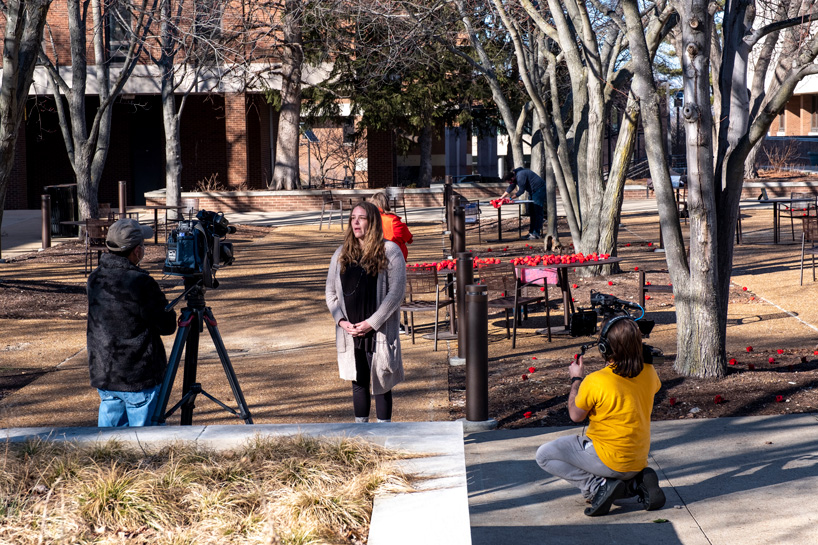
From left, Adair Seifelt, Michael Muench, Angela Kender and husband Joe Kender worked to install more than 600 roses in the Quad on Monday as part of the Rose River Memorial project honoring victims of COVID-19. Angela Kender brought along a framed photo of her and her mother, Gaye Griffin-Snyder, who died of COVID-19 in June. (Photos by August Jennewein)
Angela Kender naturally was thinking about her mother Monday afternoon as she helped to install more than 600 felt roses in a memorial for victims of COVID-19 on the Quad at the University of Missouri–St. Louis.
Kender’s mother, Dr. Gaye Griffin-Snyder, died June 6 after contracting the disease that has now claimed more than 500,000 nationwide over the past year.
Like many family members of those victims, Kender still hasn’t had a formal service to celebrate her mother’s memory because of continued health precautions to control the spread of the coronavirus.
“It was actually kind of like my own little personal service for her – although none of my family was there,” Kender said. “It was a way of honoring her and then all the hundreds of thousands of others who have been lost too.”
Angela Kender, a member of the group Marked by COVID, organized the installation, which will remain in the Quad through Wednesday. She plans to display it around the state over the next year.
Kender, a member of the group Marked by COVID, had assistance from her husband, Joe Kender, as well as Adair Seifelt and Michael Muench, to install roses in rows in the flowerbeds around the Quad.
They sought out UMSL as the site of the memorial because they wanted it to be centrally located in the St. Louis region and accessible to people who’ve been impacted the most by the COVID-19 pandemic, particularly communities of color.
The installation was part of a larger Rose River Memorial project conceived by Los Angeles-based artist Marcos Lutyens in collaboration with writer and higher education consultant Tilly Hinton.
According to Lutyens’ website, he chose the rose because it is the floral emblem of the United States and because it has been associated with spirituality dating to Greek times. The river, meanwhile, has been associated with a transitional space to the afterlife, and here represents the flow of time as it moves us on to other realms.
“His whole goal is that what’s made brings community healing,” Kender said. “It’s members of the community that create these roses.”
Girls Scouts troops from Kansas City made most of the roses, though there are plans for St. Louis-area Girl Scout troops to join in those efforts.
A cameraperson from KMOV (Channel 4) interviews Angela Kender on Monday afternoon as she helps install the Rose River Memorial in the Quad.
“We’re not done,” Kender said. “We have 662 roses at UMSL right now, but the goal is to have a rose for every Missourian who’s died. It doesn’t just have to be on the shoulders of the Girl Scouts. Other community groups can get involved – churches, schools, whatever. But the goal is to continue to make roses through 2021.”
The Rose River Memorial will remain in the Quad through Wednesday, but Kender hopes to move it around the state as it continues to grow. She imagines stops in Kansas City, Springfield, Joplin, Rolla and anywhere else that would like to have it.
Next year, the roses in Missouri and all the other roses made across the country as part of the project will be brought to Washington, D.C., and displayed for what Kender hopes will become a national COVID-19 Memorial Day.
“At this level of loss, it absolutely makes sense to have a federally recognized Memorial Day every year,” Kender said. “We’re just trying to create space for communities to mourn what’s been lost and recognize it and learn from it.”
Media Coverage:
KMOV (Channel 4)
















